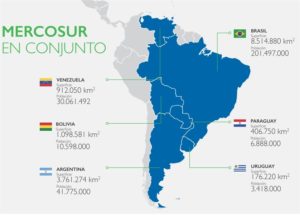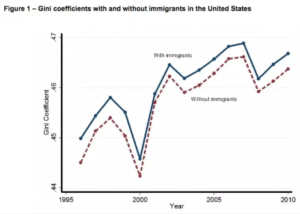¿Cuál es el problema con la Política Migratoria de Donald Trump al Separar Familias en la Frontera con México?

A view of inside U.S. Customs and Border Protection (CBP) detention facility shows children at Rio Grande Valley Centralized Processing Center in Rio Grande City, Texas, U.S., June 17, 2018. Picture taken on June 17, 2018. Courtesy CBP/Handout via REUTERS ATTENTION EDITORS – THIS IMAGE HAS BEEN SUPPLIED BY A THIRD PARTY. – RC174C9B4E40
Una injusta e inhumana aplicación de las leyes migratorias en los Estados Unidos ha desatado la indignación de un gran sector de la ciudadana estadounidense y mundial durante estas últimas dos semanas. Y no es para menos, ya que la Custom and Border Protection (CBP), agencia que es parte del Department of Homeland Security a cargo de Kirstjen Nielsen , decidió ejecutar una política migratoria antojadiza que separa las familias de aquellos inmigrantes ilegales o de personas que buscan asilo en los Estados Unidos.
Cabe señalar que muchas de estas personas que llegan desde diversos países de Centroamerica y Mexico, escapan de la violencia y amenazas contra su vida y la de sus familias en sus países de origen.
Donal Trump, el presidente de los Estados Unidos, ha declarado que esta política migratoria es producto de las lagunas legales en la legislación migratoria y que son únicamente los demócratas quienes cargan con la responsabilidad de este problema y que su administración esta solamente “aplicando la ley, porque la ley es la ley”.
Sin embargo, lo cierto es que ninguna ley federal señala que los las familias detenidas o que buscan asilo deban ser separadas y menos aun que los hijos menores de edad sean separados de sus padres mientras dure el proceso de deportación o asilo.
Lo mas indignante es que funcionarios de la administración de Trump salieron al frente a declarar su apoyo a esta política que ha sido considerada por muchos como “inhumana” y contraria a los valores de un país que es percibido como defensor de la libertad y los derechos como lo es los Estados Unidos de América.
Por ejemplo, Sarah Huckabee Sanders, Secretaria de Prensa de la Administración de Trump tuvo que recibir las criticas de un sector de la prensa americana que había hecho su investigación y descubierto que la política migratoria de separación de familias era un capricho y solo una manera de disuadir a los inmigrantes de no tocar mas las puertas de los Estados Unidos en busca de asilo, porque de hacerlo, les sucedería lo mismo que a estos inmigrantes y “asylum seekers” durante estas semanas, es decir, tomar a sus hijos y llevarlos a establecimientos alejados de ellos.
Cabe señalar que estos establecimientos eran totalmente inadecuados para albergar menores de edad ya que estos eran mantenidos bajo condiciones tan inadecuadas como estar rodeados por rejas como si fueran animales, o dormir cubiertos solo con “space blankets” sobre colchones tirados en el piso, y ni que decir de su exposición a diversos peligros que podrían atentar contra su integridad física, emocional y psicológica (trafico de personas, tocamientos indebidos, abuso sexual, violencia verbal, etc). Al respecto leer el siguiente informe: Neglect and Abuse of Unaccompanied Immigrant Children by U.S. Customs and Border Protection.
En medio de esta indignación generalizada, la hija de Donald Trump, Ivanka Trump, colgó una foto de ella con su hijo en Twitter, lo cual desato la furia de muchos ciudadanos quienes la criticaron por su indiferencia y falta de empatía en relación con los efectos de la aplicación de la política migratoria de su padre.
This is so unbelievably tone deaf, given that public outrage is growing over young kids being forcibly ripped from the arms of their parents at the border — a barbaric policy that Ivanka Trump is complicit in supporting. https://t.co/Hy1FVjLoZV
— Brian Klaas (@brianklaas) May 27, 2018
Otro funcionario que recibió las peores criticas ha sido el Fiscal General Jeff Sessions (un equivalente a Ministro de Justicia) quien justificó el trato inhumano recibido por las familias de inmigrantes y personas que buscan asilo con pasajes de la Biblia. La opinión publica comenzaba a indignarse aun mas por su parcializada lectura de la Biblia. Asimismo, su nefasta frase “La ley es la ley y nosotros solo la aplicamos” es el resumen de una irresponsabilidad por solucionar un problema tan grave de una manera mas creativa, eficiente y que respete los derechos de todos los involucrados en el problema.
Asimismo, tenemos la declaración de la Secretaria del Department of Homeland Security (DHS), Kirstjen Nielsen. La cabeza de este Departamento trató de justificar la separación de las familias alegando que no hay ningún problema en llevar a los niños a estos establecimientos que pueden compararse con “summer camps” o campamentos de verano temporales para ellos, o que “hay una vía legal abierta para todos los que quieran ingresar al país”. Esto último no convenció a muchos y las criticas no tardaron en llegar por parte de todo el mundo señalando que si dichas instalaciones eran como un “summer camp”, ella debería enviar a sus hijos a pasar un fin de semana bajo esas mismas condiciones.
Por último, en la cumbre de la indignación tenemos a un tipo que fue ex-asistente de Donald Trump llamado Corey Lewandowski, quien en una entrevista en Fox News utilizo una expresión de burla (“Womp, womp”) cuando se le indicaba sobre el caso de una niña inmigrante con síndrome de Down afectada por la política de inmigración de “cero tolerancia” de la administración Trump. Ese tipo de expresiones no se hacen, no hay justificación para ello. Eso es simplemente deprimente y bajo.
Mi posición sobre este problema:
1. En cuanto a las declaraciones de Jeff Sessions, considero que esta política de separar familias por el simple hecho de cruzar la frontera o para solicitar asilo es inhumana, sin justificación legal y solo demuestra una falta de creatividad del gobierno de Trump para solucionar el problema. Están metiendo en el mismo saco a inmigrantes ilegales y aquellos que buscan asilo en el país porque igual los separan de sus hijos mientras dure su procedimiento. Y para dejarnos estupefactos, el Fiscal General de los EE.UU. ha señalado que la Biblia justifica este trato inhumano contra quienes quiebran las leyes migratorias de los EE.UU. Personalmente, creo que el Fiscal General esta tergiversando a su beneficio lo que sea que la biblia diga. Esto no es una cuestión de religión o enseñanzas de la biblia, sino una cuestión moral con claras guías de solución.
2. Mas allá de las posiciones políticas que enfrentan a republicanos y conservadores, existen reglas éticas básicas que al revisarlas nos indican claramente que es es erróneo utilizar niños como elemento punitivo para ejecutar una ley o política pública. Eso simplemente no se hace. Lo peor de todo es que las políticas americanas siempre tienen eco en otros países. Me preocupa mucho el impacto que este tipo de política conservadora y autoritaria basada en una lectura religiosa pudiera ser peligrosamente considerada el Perú en unos años. Recordemos quien lleva las de ganar en las próximas elecciones presidenciales en el Perú, pero peor aún, quienes apoyan su candidatura (grupos ultraconservadores y homofóbicos). Espero que nunca ocurra eso y que la religión no sea jamás la base o justificación para decidir los derechos de las personas.
3. Por otro lado, es incierto el futuro de muchos niños que han sido colocados en las mencionadas instalaciones donde, según el gobierno, son bien acogidos y alimentados. Sin embargo, eso no quita que continúen viviendo en condiciones infrahumanas encerrados en celdas, llorando y preguntando en todo momento por sus padres, ni que decir de su exposición a peligros contra su integridad física y emocional.
4. Entre muchos de esos migrantes existen personas que están solicitando asilo. ¿Por qué? Los motivos son diversos pero muchos de ellos provienen de Centro América. En algunos países de esa región existe violencia de todo tipo (doméstica, urbana, criminal, política). Muchos están escapando de situaciones que son peligrosas para su vida y la de sus familias, por ejemplo, violencia domestica, la violencia de la MS-13, pandillas, trabajo forzado, abusos sexuales, carteles de la droga que te hacen trabajar para ellos y dejar de lado tus planes, conscripción obligatoria a grupos paramilitares, pago de cupos para vivir tranquilo. Muchos padres no quieren seguir en esa situación y menos quieren ese futuro para sus hijos. En los EEUU muchos republicanos critican a estas personas de la siguiente manera: “Por que vienen acá! si saben que los van a separar de sus hijos! como los exponen! Oh por Dios!”. Lo que mas indigna es que lo hacen desde la comodidad de sus hogares, sin darse cuenta que son privilegiados, cuentan con seguro social, con ciudadanía, con un trabajo, con un sueldo y seguridad económica, sin mayores amenazas contra su vida. Ellos jamas han pasado por lo que estos migrantes están viviendo, y no se les pasa por la cabeza pensar que estas personas prefieren probar suerte de esta manera que seguir viviendo en sus lugares de origen bajo esas condiciones de amenaza contra sus vidas y la de sus familias. Es cierto que existe inmigración ilegal y esta debe ser sancionada. Sin embargo utilizar a niños como elemento punitivo es algo erróneo. Simplemente esta mal. Eso no se hace.
5. La declaración de Kirstjen Nielsen: “Hay una forma legal de ingresar al país” es indignante porque es una media verdad debido a que no señala cuán caro y lento es el proceso de residencia o asilo Si, medias verdades. No todos los inmigrantes y solicitantes de asilo tienen los mismos antecedentes.
No todos son miembros del MS-13, o inmigrantes ilegales que llegan a los EE.UU. con la intención de dañar a las personas en este país o recibir bienes y servicios de forma gratuita, es decir, vivir de la ayuda del gobierno. No. Hay personas que vienen a los Estados Unidos desde sus países por diferentes motivos, como salir de purgas, violencia de pandillas, actividades forzadas a pandillas, cárteles de drogas, trabajos forzados, participación en grupos paramilitares, violación sexual, narcotráfico, pago de cuotas a delincuentes a cambio de vivir en paz. Algunos de ellos solo buscan seguridad pero a cambio están recibiendo un tratamiento inhumano.
6. Es necesario un análisis con mayor detalle con relación a los principales agentes de este problema: Los niños. Una serie de matices existen entre ellos y es necesario tomarlos en cuenta para que aquellos que apoyan la política migratoria de separación de familias puedan entender los difícil que es separar a una madre de su hijo, a saber, existen niños con problemas de salud, síndrome de down, habilidades especiales, asperger, depresión, problemas de conducta, etc. Como dije lineas arriba, es un error garrafal utilizar niños como elemento punitivo con tal de hacer cumplir cualquier ley o política migratoria.
7. Toda persona goza de derechos inherentes a su condición humana y estos derechos deben ser respetados. Los derechos humanos siempre estarán por encima de la ley o política publica de cualquier país y deben ser estrictamente respetados bajo responsabilidad y sanción de aquellos que se atrevan a vulnerarlos.
8. El hecho de que seas un contribuyente y votante registrado no te da el derecho a decirle a otros que hacer, que no hacer, o como pensar. Para muestra, pueden escuchar al tipo llamado “Tony” que interviene en este podcast en 23:31 – NPR: Your Feelings On Family Separations At The Border.
9. Siempre es bueno colocarse en los zapatos del otro. Pensar siempre en el concepto de “alteridad” para derribar prejuicios que solo llevan a situaciones tan nefastas como esta. Tomar en cuenta los detalles, los matices y los motivos de toda decisión que haga una persona nos podrá hacer ver mas allá de las ideas que fundamentan escollos del desarrollo humano como son la xenofobia, el racismo, y la injusticia.
Conclusiones:
- La política de separación de familias en la frontera con México es a todas luces una táctica que utiliza el miedo y la incertidumbre como elemento disuasivo para aquellos que crucen la frontera ilegalmente o para aquellos que buscan asilo en los Estados Unidos. Es una política antojadiza de la administración de Donald Trump que envía la siguiente advertencia: “Si tocas nuestra puerta o ingresas ilegalmente, te sucederá lo mismo”.
- La inmigración ilegal debe ser sancionada, pero utilizar a los niños y hasta bebes como elemento punitivo contra los padres es un error muy grande. El solo hecho de afectar negativamente la libertad, los derechos parentales y el interés superior del niño en pro de la ejecución de una política migratoria irregular es una decisión equivocada e inconstitucional.
- La religión y la Biblia nunca deben ser utilizados para justificar un trato inhumano o injusto. Creas o no creas en ella, la separación de familias no es una cuestión de religión o lectura de pasajes de la biblia, sino de moralidad.
- La ética parlamentaria debe de estar por encima de cualquier enfrentamiento político, especialmente en asuntos donde esta involucrada la protección del interés superior del niño.
arturodiazf








